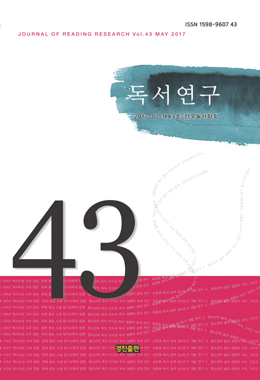이 연구는 우리나라 초등학생들이 부모, 교사, 친구, 누리꾼과 같은 문식성 후원자들이 자신들의 디지털 기반 활동과 관련하여 어떻게 영향을 미치고 있다고 인식하는지 탐구하였다. 이 연구는 전국의 초등 3~6학년 학생 10,111명을 대상으로 한 조사 연구로, 문식성 후원자들의 `가치 부여`, `모델링`, `통제`에 관한 인식을 묻는 문항과 디지털 기반 활동 참여 시간을 묻는 문항으로 구성된 도구를 사용하였다. 연구 결과, 초등학생들은 자신의 디지털 기반 활동에 부모의 통제가 가장 큰 영향을 미친다고 인식하는 것으로 나타났다. 또한 초등학생들은 디지털 기반 활동이 일어나는 공간인 인터넷에 대한 친구들의 가치 부여를 중요한 문식성 후원 양상으로 인식하는 것으로 나타났으며, 이러한 경향은 학년이 올라갈수록 증가하였다. 이러한 결과는 전통적 부모와 교사라는 전통적 문식성 후원자 이외에 또래 집단에서 공유되는 디지털 문식 경험에 대한 가치 부여가 초등학생들의 디지털 문식성 인식과 활동에 영향을 미칠 수 있음을 시사한다. 한편, 문식성 후원자가 초등학생의 디지털 기반 활동 참여 시간에 영향을 미칠 것이라는 예상과 달리, 영향의 정도는 미미한 것으로 확인되었다. 이는 초등학생의 디지털 기반 활동을 설명할 수 있는 또 다른 변인이 존재할 수 있음을 시사한다.
The present study explores how different literacy sponsors such as parents, teachers, peers, and internet users would influence elementary-school students` digital literacy practices. The study was conducted with Grades 3~6 students (n=10,111) in Korea, using the items about literacy sponsor activities (i.e., valuing, modeling, control) and the amount of time that the students spend for digital literacy activities. The results indicated three patterns. First, the elementary students in this study perceived that parental control is the most influential in their digital literacy activities. However, parental control did not predict the amount of time spent for digital literacy activities by the students. Second, the respondents reported that peer value was the second most important factor that affects their digital literacy activities. This perception tended to increase as they go up to higher school grades. Last, the respondents perceived that anonymous online users did not significantly affect their digital literacy activities and that the online user factor did not predict the amount of time spent for digital literacy activities by the respondents. The results imply that in addition to traditional literacy sponsors such as parents and peer groups their value system should be considered in understanding students` digital literacy activities.


